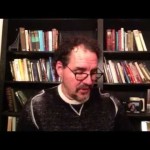We run our website the way we wished the whole internet worked: we provide high quality original content with no ads. We are funded solely by your direct support. Please consider supporting this project.
How do I avoid feeling like God is absent?
Question: I used to see God involved in everything and used to believe every event expressed God’s will. After my wife and I lost our child in a tragic accident, and as a result of reading your books (especially Is God to Blame?), I came to embrace the warfare worldview and the open view of the future. This helped my wife and I deal with our tragedy, but over the last few years I’ve noticed a negative consequence. Because all free agents have “say so” and because of the innumerable complexity of variables that affect all that comes to pass, I’m beginning to see the world as completely random! I have trouble seeing God involved in my life and in world history at all. Because of all the variables that affect what comes to pass, I have no assurance that my prayer will be answered and no assurance that any event in my life has a divine purpose. I also find myself worrying that I will die a random, meaningless death. How do I avoid feeling like God is absent?
Response: I’m so sorry for the loss of your child, and I totally understand your sentiments. When a person has grown accustomed to seeing everything as reflecting God’s will, embracing the notion that agents have genuine “say so” and embracing the complexity of the world can push them to an imbalanced opposite extreme where they begin to see everything as completely random. See if this reframe helps.
You can and should continue to see God involved in every thing at every moment. Nothing happens that he is not on some level involved in – nothing. In fact, things only exist because God is himself holding them in being (Heb. 1:3). But where free agents are involved, God is present not in a unilateral coercive way but in a loving responsive way. This means that there is no gratuitous suffering –– even if you’re accidentally killed. Not everything happens for a divine purpose – as though God brought it about. But everything happens with a purpose. That is, God doesn’t bring about every particular event for a purpose, but he certainly brings a purpose to every particular event.
Not only this, but since God is infinitely intelligent, he can anticipate each and every future possible event as effectively as if it had to happen. (We humans loose anticipatory effectiveness when we consider possibilities over certainties only because we are limited in intelligence and have to spread our intelligence thin to cover the possibilities). So the purpose God brings to events is one he’s been preparing from the foundation of the world – in case the event happened. Whatever comes to pass, God has been anticipating that very event from the foundation of the world as though it had to happen. It’s just that God is so smart, if you will, the event didn’t have to happen for God to prepare for it as though it did have to happen. In this light an open theist can have as much assurance as the classical theist that there’s an eternal divine purpose for events.
So, if it happens that you or I end up dying in a random accident, our open theists friends do not have to believe it happened for a divine purpose. But they should believe it happened with a divine purpose, prepared from the foundation of the world, and that God will somehow make our death meaningful by weaving it into his divine plan. And they should affirm that this divine purpose is just as perfect as it would have been had God foreknown with certainty that we would die just as we did.
Regarding prayer, it’s of course true that in the open view one can’t be assured that prayer will have the outcome one is praying for because of the complexity of variables. But no view can give you this assurance. (Think about it: the success rate of prayer is no greater for Calvinists or classical Arminians than it is for Open Theists). In fact, if the future is settled from all eternity (whether by God’s will or simply in God’s knowledge) as the classical view holds, then its really very hard to see how prayer can make any real difference. You can’t change something that is eternally settled. By contrast, in the open view we’re able to consistently affirm that things genuinely hang on prayer.
Still, we usually have to simply trust God’s Word when he tells us that prayer is “powerful and effective” (James 5), for whether we’re an Open Theist or Classical Theist, we more often than not don’t see our prayers “answered.” But rest assured that God is never absent and that your prayer makes a difference in affecting what comes to pass.
Category: Q&A
Tags: Open Theism, Q&A, Warfare Worldview
Topics: Hearing God, Prayer
Related Reading

God’s Regrets and Divine Foreknowledge
One aspect of the portrait of God in Scripture that suggests the future is partly open is the fact that God sometimes regrets how things turn out, even prior decisions that he himself made. For example, in the light of the depravity that characterized humanity prior to the flood, the Bible says that “The Lord…

How do you respond to Isaiah 45:7/Lamentations 3:37–38?
The Lord says,“I form light and create darkness, I make weal and create woe; I the Lord do all these things” (Isaiah 45:7) “Who can command and have it done if the Lord has not ordained it? Is it not from the mouth of the Most High that good and bad come?” (Lamentations 3:37-38) Calvinists…

Free Will: What does Quantum Theory suggest?
Bet you didn’t think we’d be going here. Greg discusses how quantum theory supports the idea of free will.

Is speaking in tongues the initial evidence of receiving the baptism of the Holy Spirit?
Pentecostals have traditionally taught that speaking in tongues is evidence that a person is filled with the Holy Spirit. Those who defend this position do so primarily on the basis of a pattern they discern in Acts. They note that when the disciples were first baptized in the Spirit on the day of Pentecost, “all…

The Incarnation: More Than a Rescue Mission
A mistake people often make concerning the Incarnation is that they fail to distinguish the eternal plan of God to unite himself with humanity in Christ, on the one hand, from the atoning significance this plan acquired after the fall, on the other. Some therefore think of the Incarnation as a sort of “Plan B”…

A Very Brief History of Open Theism
While the open view of the future has always been a very minor perspective, it has had its defenders throughout Church history and it has never been called “heresy” (until in mid 1990s when some started using this label). According to some African American church leaders, it has been the predominant view in the African…
